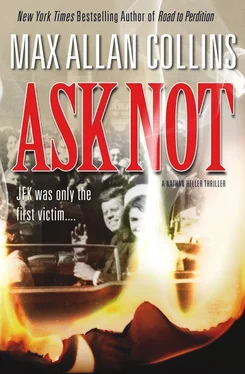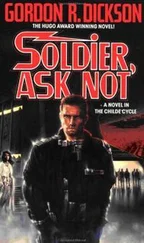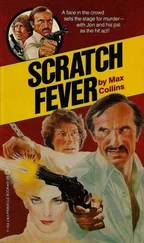Anyway, when he come out with his shirt covered in blood, Mac waved the gun at the golfers nearby, told ’em to stay back, and then he drove off in that blue station wagon, a Pontiac. The witnesses saw the license plate was Virginia, not something you see every day in Austin, and they got the number and wrote it down. Mac got picked up right away, and there was some jurisdictional nonsense between the Austin police and the county sheriff, so the Rangers got brought in. It became my case, which is why I can tell you all this in an insider kind of way.
Mac was charged with murder, and right off the bat, he resigned his government job. Shortly after that, he got released on thirty-grand bail, thanks to a couple of LBJ’s financial backers, and an attorney of Lyndon’s, John Cofer, out of Ed Clark’s office, showed up to defend Mac. Cofer’s the same guy who defended Johnson for ballot-box stuffing in 1948.
Mac did not testify in his own defense. Hell, Cofer acknowledged his client’s guilt — after all, we had the car, the bloody shirt, and a damn .22-caliber cartridge in the suspect’s possession. What had me shakin’ my head, though, was when the district attorney stated he could find no motive for the murder.
That’s right, Mr. Heller. Nothing about the sex stuff came out at the trial, and certainly not that Josefa Johnson had been in a sex triangle with the murdered man and Mac’s wife. Or I guess it’s sex quadrangle, if you count Mac.
No evidence at all was introduced from either side about cause or extenuating circumstances. After a trial that lasted less than two hours, the jury found Mac guilty of “murder with malice aforethought.”
Guess what he got for killing a man in cold blood? A five-year sentence — that is, a five-year suspended sentence. Not exactly the “Texas justice” you hear so much about, like the kind all those colored boys on Death Row are waitin’ on. First suspended first-degree murder sentence in Texas history. Maybe the only one.
I hadn’t been a Ranger very long, but I’d been a deputy sheriff and a highway patrolman, and could recognize the whiff of politics. The stench of it. Do I think LBJ directed Mac to kill a blackmailer? Hard to say. But any way you slice it, Mac sure did Senator Johnson a favor by shootin’ a par five at the pitch-and-putt.
Peoples took a deep puff of his cigar, which had largely been forgotten in his ashtray while he spun his yarn.
He expelled some smoke, then said, “Hell’s bells, that’s rude of me. Would you like a cigar, Nate? I got a box of Senators right here. Made over San Antonio way.”
Somehow a Texas Senator seemed fitting, but I said, “Thanks. Smells fine. But I’m not a smoker.”
“Clean-cut fella, huh?”
“Not exactly. But I haven’t smoked since I was in the Pacific, and then just cigarettes.” I only got the urge when I was in a situation that recalled combat.
“Then can I have Ruth fetch you another Dr Pepper, Mr. Heller?”
“No thanks. But maybe you should call me ‘Nate.’ I’m starting to feel like we know each other.”
Peoples grinned; even those blue eyes seemed to have warmed up. “Only if you call me ‘Clint.’”
“Okay — but I thought the only Westerners called Clint were on TV.”
That made him smile. “Nate, I ain’t never been mistaken for Cheyenne or Rowdy Yates.”
“I’ll take your word for it, Clint.”
He blew a smoke ring, just showing off, and rocked some more. “So let’s talk about the late Henry Marshall, Nate. You know the basics, I believe.”
“The very basics.”
“The facts are easily laid out. Marshall was well-regarded, both as a man and a public servant. He worked for the Agricultural Stabilization and Conservation Committee.”
“That’s a mouthful.”
“It is. He traveled a lot, and he worked hard — lived over in Bryan, nice family, who incidentally don’t buy his suicide, neither. Had a ranch in Robertson County, which was a mostly a hobby of his. Place to get his mind off work, mending fences, seeing to crops, feeding cattle.”
Peoples gave me a quick refresher on the case. After discovering that LBJ’s pal Billie Sol Estes had been raking in over twenty million a year for “growing” and “storing” nonexistent crops of cotton, Marshall made his report to Washington, recommending a full-scale investigation and more stringent regulation.
“Suddenly Marshall gets offered a higher-up position in another department,” Peoples said, “including a hefty pay raise, that would not so coincidentally make the Billie Sol matter none of his concern.”
Marshall rejected the new position and instead spent the next several months meeting with various county officials in Texas as well as the farmers who’d been drawn unwittingly into the scam, and just generally spreading the bad word about Billie Boy.
Shortly after, Henry Marshall turned up dead in a pasture on his ranch alongside his Chevy Fleetside pickup truck.
“No suicide note, by the way,” Peoples said.
I asked, “How can anybody buy a suicide shooting himself five times?”
“It was a .22 rifle,” Peoples said with a shrug, relighting his cigar, puffing it back to life. “What the sheriff and coroner didn’t think of — or if they did, conveniently forgot about — was that Marshall’s rifle was bolt-action. He’d have had to hold the damn thing at arm’s length to work the bolt to reload after every shot, getting wounded every time — two of ’em ‘rapidly incapacitating’ wounds, our staff coroner said. And here’s the kicker — ol’ Henry had a bum right arm, from an old farm injury. Couldn’t hold the damn thing out straight if his life depended on it.”
Or his death.
I said, “Sounds like the exhumation brought all the evidence out. So is it murder on the books now?”
Peoples shook his head glumly. “No. There was a ringer on the grand jury, a relative of the sheriff’s, who wouldn’t budge. Either the sheriff was bought or just didn’t want to look stupid. Also, an FBI agent came in, looked at the evidence, and called it suicide, too.”
“And those guys are generally pretty good,” I said. “That’s a hard one to figure.”
“Your Senator McClellan couldn’t get anywhere, either, even after he stood up at his committee hearing with the rifle and showed how hard it would be to work the bolt action at arm’s length without a bum wing.”
“So it’s a closed case.”
“Not from where I’m sitting.” His frustration dissolved into a sly grin. “You wondering yet, Nate, why I started by telling you the sorry tale of Mac Wallace?”
“You know I am.”
“Here’s that later photo of Mac I promised you.” He handed it over. “That’s still over ten years old — he’s camera-shy, our man Mac.”
Wallace no longer looked like a college kid — the glasses were black-rimmed, the eyes cold, hair still dark, the strong jaw resting on fleshy support, eyebrows dark and heavy, but still a broodingly handsome man.
“Latest photos available come from the Doug Kinser murder trial in ’52,” Peoples said. “But take a look at this sketch.”
Though crude, it resembled Wallace, all right — black-rimmed glasses, similar hair.
“Where does this come from?”
“A sketch artist of ours drew it from a description provided by a gas station attendant who gave directions to a man looking for the ‘Marshall place’ the afternoon of the killing.”
I sat shuffling through the two photos and the police sketch, feeling the hair on my arms prickle and it wasn’t the work of that window air conditioner.
I said, “You’re saying Mac Wallace killed Henry Marshall.”
Читать дальше












